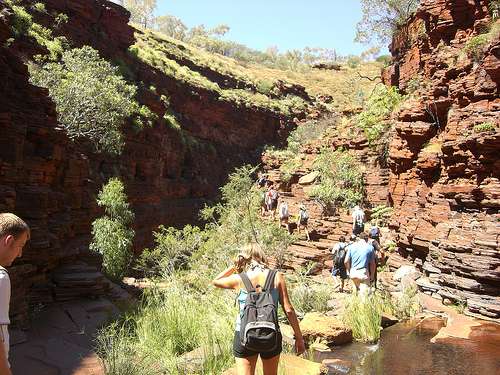“When you go into the more remote parks, like the study that we did at Karijini National Park (pictured), the satisfaction and the loyalty to these parks is already so high,” she says. Credit: Pat Scullion
Interactions between visitors to Karijini National Park in the Pilbara and park rangers makes for happier visitors, according to recent research.
The research involved a survey which was distributed to all adult visitors who were exiting the park to assess whether ranger presence influenced visitor satisfaction and loyalty.
Murdoch University scientist Dr Kate Rodger says they were trying to establish what satisfies national park visitors.
"We've looked at service quality attributes which is more infrastructure and facilities and then there's these whole other world of benefits which is what people gain from being in the park and that's the area we really need to pay attention to," she says.
They found a strong and positive relationship between ranger engagement and visitor happiness, however determining its effect on loyalty and satisfaction was difficult.
"When you go into the more remote parks, like the study that we did at Karijini National Park, the satisfaction and the loyalty to these parks is already so high," she says.
"Although, the ranger presence made a difference on the attribute it didn't make a difference on overall visitor satisfaction and loyalty because I think it's already that high."
"People love having rangers there because they have that bonus interaction.
"When you put a ranger in a park people are happier with that presence, they enjoy the park more and they're happier but that doesn't mean that they are more loyal or satisfied but they are happier during that visit."
Ranger's role evolves
The researchers found that despite current ranger expectations revolving around facility maintenance, their ability to interact with park visitors is just as important in determining overall satisfaction.
"The role of the ranger has changed to more maintenance and looking after facilities rather then interacting with people and I think our studies are showing that interaction with people is important and visitors do enjoy that," Dr Rodger says.
"I think we need to go back to them having that role of greeting and sharing that knowledge of the park they're working at because most of them love that park and have a wealth of knowledge to be shared."
More information: Using a randomised experiment to test the causal effect of service quality on visitor satisfaction and loyalty in a remote national park, Tourism Management, Volume 50, October 2015, Pages 172-183, ISSN 0261-5177, dx.doi.org/10.1016/j.tourman.2015.01.024
Provided by Science Network WA





















